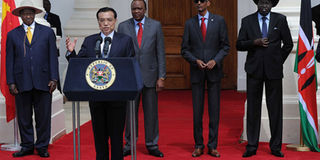Kenya, China ink Sh327bn railway line agreement

Chinese Premier Li Keqiang (L) gives a speech next to (L-R) Uganda's President Yoweri Museveni, Kenya's President Uhuru Kenyatta, Rwanda's President Paul Kagame, and South Sudan's President Salva Kiir on May 11, 2014 after the signing of the Standard Gauge Railway agreement at the State House in Nairobi. AFP/PHOTO
What you need to know:
- The standard gauge railway deal — which will lead to the construction of a 609-km railway line — will cost Sh327 billion. China will finance 85 per cent of the total cost through Export and Import (Exim) Bank of China while Kenya will pay the remaining 15 per cent through the railway levy charged on imported goods.
Hopes of building a modern railway line in East Africa rose yesterday after Kenya and China signed a financial agreement committing the two countries to the Sh327 billion mega project.
President Uhuru Kenyatta and Chinese Premier Li Keqiang led regional heads of states including presidents Yoweri Museveni (Uganda), Paul Kagame (Rwanda) and Salva Kiir (South Sudan) in witnessing the signing ceremony at State House, Nairobi.
The contract was signed by National Treasury Cabinet Secretary Henry Rotich and the Chinese minister of Commerce, Mr Gao Hucheng.
The standard gauge railway deal — which will lead to the construction of a 609-km railway line — will cost Sh327 billion. China will finance 85 per cent of the total cost through Export and Import (Exim) Bank of China while Kenya will pay the remaining 15 per cent through the railway levy charged on imported goods.
President Kenyatta thanked China for its development commitments in Kenya and other African countries. He said the signing of the agreement marked the end of the “lunatic express” — the old railway line built by the British during the colonial era.
MAJOR ENGAGEMENT
“Today, we celebrate the signing of the agreements for that new line. After setbacks and heated disagreements, we found a honourable partner in the People’s Republic of China,” the President said. “No project of this magnitude could have been completed without the help of our friends. We will best appreciate the scale of help we have received from our partners in the People’s Republic of China if we remember our history.”
While addressing a joint press conference with Mr Kenyatta, Mr Keqiang said that the signing of the agreement of the railway line was just the beginning of major economic engagement with Kenya and the region.
He asked Chinese firm involved in the construction to ensure they maintain high standards and that only equipment that meet the required quality measures are used.
“We need to ensure that there is adequate training for local employees to ensure the management of the project is up to the standard and required quality. We also want Chinese companies operating in Kenya to comply with local laws and custom regulations,” Mr Keqiang said.
Describing China as the largest developing country in the world and Africa as the home of the world’s largest developing countries, Mr Keqiang said he was optimistic that with enhanced cooperation between this two economies greater global development will be achieved.
The appointment of China Road and Bridges Corporation to take charge of the first phase of the railway construction project attracted major controversy in Kenya.
Issues raised included absence of public bidding, which Kenyan officials have insisted was a condition for acquisition of Chinese loans to fund construction while some MPs led by Nandi Hill’s Alfred Keter claimed that the price had been inflated compared to what other countries in the region were spending on their railway projects.
However, the Transport and Public Works Committee chaired by Starehe MP Maina Kamanda and the Public Investment Committee chaired by Eldas MP Aden Keynan finally gave their approvals for the project to commence.
THE NUMBERS
Other deals struck during the visit
17
Total number of agreements that Chinese PM signed during his visit.
170bn
Amount to be spent to set up the China Africa Development Bank.
880m
Amount to be spent on ecological and wildlife protection.




